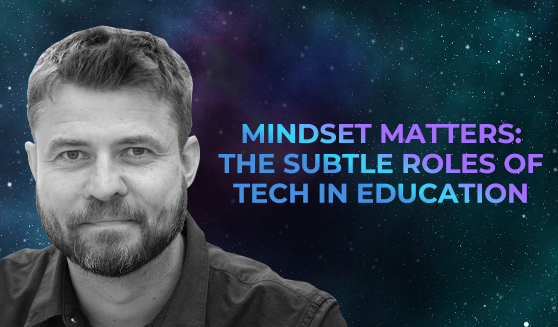
What makes a city ready for a smart future?
Discover the cities that rank highly for smart city preparedness, and learn why locally relevant innovation is more important than cutting-edge tech.


Schools around the world have adopted tech as part of their educational programming. The common rhetoric is that technology gives students access to a wealth of information, quicker learning pathways, and gamified (fun) ways to learn important information and skills.
That’s all true. But tech plays several more subtle roles in education, too – so we asked Mads Skrubbeltrang (Rector at Ørestad Gymnasium) to shed light on some of the quieter ways in which tech influences students’ learning outcomes.
In 2012, Ørestad Gymnasium was listed by the German edition of the Financial Times as one of the most modernised schools in Europe. In case you didn’t know, a Rector is the Danish equivalent of a school Principal, or Head Teacher. As Rector, Skrubbeltrang is responsible for the economy of the school as well as the teaching; and as a tech-positive education professional, he’s passionate about integrating technological learning at every level.
In 2020 McKinsey published a report detailing new global data on the impact of technology on education. It was packed with insightful, actionable information about how to boost the outcomes associated with tech in schools – like the fact that certain types of device are associated with better student outcomes, and that technology alone can’t change a school’s overall performance level; better performing schools will perform even better with tech, while tech in badly performing schools can actually drive even poorer results.
But something that was not a key focus of that report was student behaviour around technology and in online spaces. For Skrubbeltrang, teaching students how to interact safely and productively online is essential.
“We have a 100% digital platform for our teaching,” he noted, “and it is a key objective for me to ensure that our students have great technical skills and that we use the technology to create a feeling of fellowship. Technology is important for education because we need to train technical skills. But we also need to make the students aware of the fact that your behaviour online has an impact. The students need to reflect on what the right behaviour is when you are online.”
This is crucial right now, as a growing number of regional watchdogs (including in the US, the MENA region and Europe) report increased cyberbullying among young people – leading to poor mental health and a global spike in youth suicide rates.
And it’s also important for students’ careers later on: young people who understand their online behaviour now could affect how they’re viewed by peers and employers in the future are more likely to become responsible digital citizens.
We asked Skrubbeltrang how tech can drive creativity and innovation among young people, and he said:
“As long as you have teachers who explore the technological opportunities and use [tech] in the classroom – then you can go far with technology as an innovative tool. It is the mindset of the teachers which is important.
“When the teachers see the technology as something that you need to explore and spend time and effort to learn to use – then you can create an innovative environment for the students. But at the same time the use of technology should be easy for all students – the technology must not estrange them. It has to make them curious.”
This is a refreshing take on the relationship between tech, students, and teachers; because when the tech industry talks about the impact of edutech, the role of individual teachers and their own perspective on technology is often neglected. It connects back to that McKinsey report, and the revelation that poorly-performing skills can do worse as a result of tech – because the relationships that students have with teachers has to come first.
You can’t just put cutting edge technology into a classroom and expect to see great results. The use of that tech has to be mediated through the student-teacher relationship; to inspire curiosity, experimentation, and an excitement about the idea of exploring the possibilities that could be enabled by technology and technological skill.
Over the course of Skrubbeltrang’s career, he noted, “technology in education has changed from being something exotic and difficult, to a mandatory tool that helps innovative thoughts come alive. In the future the technology will, hopefully, empower the students and help them to become more independent. But I also hope that the use of technology will make it easier for students to engage in activities that promote social entrepreneurship.”
It’s an optimistic hope – and one that we share at LEAP. We asked how access to tech (and by extension, that increase social entrepreneurship) could impact wider society, and Skrubbeltrang said:
“If more students have access to tech, then hopefully more young people around the world will communicate more and thus become more culturally aware, and be able to learn more about other cultures. The more we know about other cultures and the more we cooperate with students from other cultures, the easier it will be to understand and sympathise with people around the world.”
“That’s how we should use technology when we discuss the role of tech and its impact on wider society,” he added. And we couldn’t agree more: tech has the potential to reduce our sense of ‘otherness’, and cultivate an understanding that we’re all in this world together.
Thanks to Mads Skrubbeltrang at Ørestad Gymnasium. Join us at #LEAP23 to learn more.

Discover the cities that rank highly for smart city preparedness, and learn why locally relevant innovation is more important than cutting-edge tech.

If you’ve ever thought about becoming a tech investor, read this – learn why investors are the quiet force shaping the future of the industry.

Tech generalists will enable emerging technologies to integrate across industries and societies in meaningful ways. We still need specialists – but we also need big-picture people.

Discover the cities that rank highly for smart city preparedness, and learn why locally relevant innovation is more important than cutting-edge tech.

If you’ve ever thought about becoming a tech investor, read this – learn why investors are the quiet force shaping the future of the industry.

Tech generalists will enable emerging technologies to integrate across industries and societies in meaningful ways. We still need specialists – but we also need big-picture people.